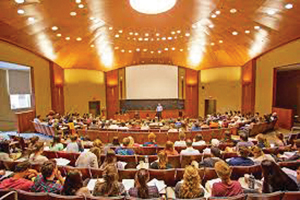
Once again, Election Day has come and gone, and with it a plethora of day school in-service programs. Individual schools, counties and entire regions take advantage of this day (and others like it) to hold professional growth seminars and workshops. There are many experts in a variety of fields who are called upon to share their wisdom with teachers. Indeed, there are many new developments in the field of education in general and in specific areas based on subject matter and the age of students being taught. There are general education methodologies suitable for all teachers, and there are subject and age-specific topics. However, I question the entire premise that there is validity and value to a one-time presentation without follow-up. I am also concerned that many of the expert theorists would not be able to handle an actual fifth-grade class in any subject, much less introduce a new technique or approach to a subject. It’s important that presenters have actual classroom experience.
Teachers know what they know, and they show respect to those who can impress them with something that they do not know. A veteran classroom teacher may be using outmoded techniques even if “they work.” A novice teacher doesn’t yet have the experience to know what he/she doesn’t know. When a really knowledgeable presenter makes a point and heads nod, that’s gold.
Veteran teachers as well as novices can benefit from current educational research. However, training of anyone in any area involves repetition and supervision. If a school really wants to improve student learning and hone the skills of its teachers, several things need to take place.
First and foremost, the principal needs to be an educator and educational leader. As such he/she is expected to be aware of current trends and research in the various fields under his/her supervision. That’s the job. The principal is also expected to observe teachers and visit classes on a regular basis to be aware of the pluses and minuses of the teaching staff.
Secondly, in consultation with the faculty, the principal needs to prioritize one or two areas each year that could use improvement. Then determine on a grade-by-grade basis, or by subject, who could best generate the improvements needed. Number three are the presentations themselves, again broken down by subject and grade. Number four is what is missing in the wholesale in-service programs—follow-up. Periodically, either the presenter or the principal needs to check to see if whatever program or methodology that was proposed actually is employed, works, and improves student learning, behavior or other predetermined goal or achievement.
Granted that there are approaches that cut across all grades and subjects. And also granted that in these county-wide, in-service programs teachers may choose from an old-school “Chinese” menu of options. But in the end, if there is no follow-up it’s a waste of time, energy and resources. It’s also a budgetary issue, but educational improvement should be every school’s top priority.
Professional development in any field is important. Continuing education is mandatory for doctors, attorneys and CPAs. Sometimes it can be as simple as having a novice teacher observe a master teacher at work. Schools can arrange “teaching rounds,” much like medical rounds. Sometimes teachers can observe videos of themselves teaching and see for themselves if they speak too quickly, fail to wait adequately for a response to a question, only call on girls, etc. There are many modalities to improve classroom instruction. Mass non-specific in-service programs without follow-up are not the best way to achieve it.
Dr. Wallace Greene, a veteran educator, is the incoming principal of Yeshiva Keter HaTorah of Passaic-Clifton, a new mesivta high school.












